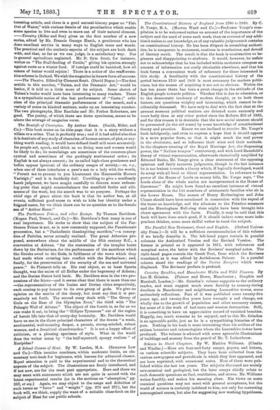subject and the need of some such work, than on
account of any addi- tion it makes to our knowledge, or of any valuable judgments it contains on constitutional history. He has been diligent in consulting authori- ties, he is temperate in statement, cautions in conclusions, and devoid of literary merit. The result is that the book is unattractive to be- ginners and disappointing to students. It would, however, be unfair not to acknowledge that he has included within moderate compass an amount of information not easily obtainable elsewhere, and that his book forms a convenient work of reference for those interested in this study. A familiarity with the constitutional history of the period between 1760 and 1860 is most necessary for modern politi- cians, but the means of acquiring it are not so obvious. Within the last ten years there has been a great change in the attitude of the English people towards politics. Whether this is due to education, or to the democratic tendency of modern thought, or to both these factors, are questions weighty and interesting, which cannot be in- cidentally discussed. We have only to deal with the fact that at the present moment political matters are debated more earnestly and more hotly than at any other period since the Reform Bill of 1832, and for this reason it is desirable that the new social stratum should be permeated (in the old sense) by some knowledge of constitutional theory and practice. Hence we are inclined to receive Mr. Yonge's book indulgently, and even to express a hope that it should appear in a more popular form, so that it might reach the real power in the electorate, and so influence their aims and their methods. In the chapters treating of the Royal Marriage Act, the dispensing power, the " Nullum tempus " controversy, and with Lord Mansfield's theory of virtual representation, afterwards rhetorically amplified by Edmund Burke, Mr. Yonge gives a clear statement of the opposing opinions and fairly accurate judgments, though in the last instance he is too lenient towards a theory which, if logically developed, would do away with all local or direct representation. In reference to the power of the House or Lords on money bills, Mr. Yonge says, "The Lords alone of the whole nation are unrepresented in the House of Commons." He might have found an eminent instance of virtual representation in the 144 members of aristocratic families who sit in the Lower House. The names of Henry Hetherington and John Cleare should have been mentioned in connection with the repeal of the taxes on knowledge, and the allusions to the Peterloo massacre and the Birmingham Boll-ring riots might have been brought into closer agreement with the facts. Finally, it may be said that this book will have dona mach good, if it should induce some more inde- pendent thinker, some more skilful writer to treat the subject.


































 Previous page
Previous page